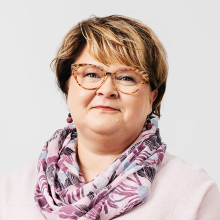
The network project Strategic Management of SDGs in Cities

The network project Strategic Management of SDGs in Cities involves six of Finland's largest cities: Helsinki, Espoo, Tampere, Vantaa, Oulu and Turku. The project partners include Helsinki-Uusimaa Regional Council, the Prime Minister's Office, the Secretariat and National Commission on Sustainable Development, the Ministry of Economic Affairs and Employment and the Ministry of the Environment.
The project aims to support the six cities in the implementation of the Agenda2030 SDGs on the local level and in bringing about a change in the thinking and operating culture that is required for achieving a sustainability transformation. The purpose of the network project is to ensure long-term sustainable management of the six cities during the next council term. The aim is also to increase the understanding and capacity among elected representatives, professional management, and personnel to implement sustainable development goals.
The six cities are collaborating closely and actively with stakeholders on the national level. The cities are also influential and visible partners in the global framework for sustainable development. The project promotes national and international cooperation and co-development related to sustainable development work.
Within the framework of the network project, the six cities have jointly developed systemic management models and concrete tools for sustainability management. The co-development results are available on the network´s website free of charge to the whole local government sector.
Funded by the Ministry of Economic Affairs and Employment and coordinated by the Association of Finnish Local and Regional Authorities, the network was launched in November 2021. In 2024–2025, the network project will continue its work with funding from the Association of Finnish Local and Regional Authorities and the six cities.
Open all
Finland’s six largest cities combine their efforts to promote sustainable development management
Finland’s six largest cities — Espoo, Helsinki, Oulu, Tampere, Turku and Vantaa — have combined their efforts to tackle one of the greatest challenges of our time: How to promote and manage the sustainable development goals (SDGs) in cities?
The cities are participating in an SDG network project that promotes a fundamental shift in thinking necessary for achieving a sustainability transformation. The project also seeks to mainstream SDGs through co-development.
The work on sustainable development in line with the United Nations global Agenda 2030 for Sustainable Development is already well underway in the six cities. These cities are national, even international pioneers; however, work remains to be done to verbalise sustainable development and make it more mainstream and visible.
It is not enough that the six cities have the information needed to promote sustainable development; they need to apply this information and use it locally.
The network Strategic Management of SDGs in Cities seeks to address this need. The network supports the decision-makers, personnel and stakeholders of the six cities in
- implementing the Agenda 2030 SDGs locally, and
- bringing about a change in the thinking and operating culture necessary for achieving a sustainability transformation.
The network will support the co-development of systemic management models for sustainability management and practical management tools.
New tool under development
The first tool to be co-developed and piloted by the six cities will be an SDG sense-making tool.
It is a dialogue-based process, which guides decision-makers and employees in different areas of responsibility to consider how their work is linked to the Agenda2030 SDGs; how they can promote these goals through their own work; and how they can monitor the progress. The SDG analysis process aims to ensure that decision-makers and municipal employees take action towards achieving the Agenda 2030 and that they understand the demands that a cross-administrative sustainability transformation places on future management.
Ecosystem school for co-development
In spring 2022, the SDG network will participate in a so-called ecosystem school with the Association of Finnish Local and Regional Authorities, the Sustainable City programme of the Ministry of the Environment, and Motiva, a state-owned company providing expert services in the field of energy efficiency and renewable energy. The ecosystem school provides answers to these questions: What does it mean to promote sustainable development in an ecosystem formed by cities, municipalities and organisations? How can the different operators support and complement each other? The objective is trends-based co-development across organisational boundaries. The ecosystem school is part of the TYÖ 2.0 LAB pilot project, which offers workspace for co-development and learning for central government employees.
In addition to creating practical tools and operating models, the SDG network seeks to promote national and international cooperation and co-development related to the work on the SDGs. As part of its pioneering role, the network is contributing to the implementation of the national sustainable development road map. The six largest cities will also attend the annual Eurocities conference in Espoo, Finland, on 8–10 June 2022 and the World Urban Forum on 26–30 June 2022.
The network Strategic Management of SDGs in Cities started as a project in November 2021. It is funded by the Finnish Ministry of Economic Affairs and Employment and the Helsinki-Uusimaa Regional Council, and coordinated by the Association of Finnish Local and Regional Authorities. The project will continue until the end of 2023. The tools co-developed and piloted by the six largest cities will become available for the entire local government sector in the future.
For more information, you can contact our specialists

+358 9 771 2182, +358 50 597 0104

Sini Sallinen
Director, Local Politics and Local Government Management
+358 9 771 2681, +358 50 464 5662